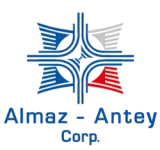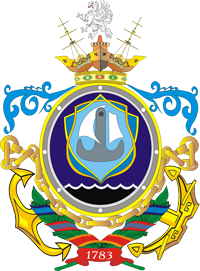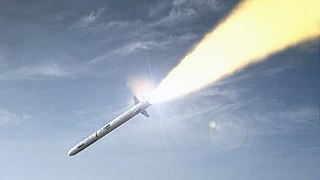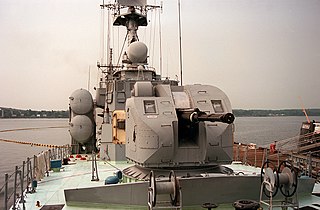
The Buk is a family of self-propelled, medium-range surface-to-air missile systems developed by the Soviet Union and its successor state, the Russian Federation, and designed to counter cruise missiles, smart bombs and rotary-wing aircraft, and unmanned aerial vehicles. In the Russian A2AD network, Buk is located between the S-200/300/400 systems above and the point defense Tor and Pantsir type systems below.

The Talwar-class frigates or Project 11356 are a class of stealth guided missile frigates designed and built by Russia for the Indian Navy. The Talwar-class guided missile frigates are the improved versions of the Krivak III-class frigates used by the Russian Coast Guard. The design has been further developed as the Admiral Grigorovich-class frigate for the Russian Navy. Six ships were built in two batches between 1999 and 2013.

The Type 730 is a Chinese seven-barrelled 30 mm Gatling gun/rotary cannon CIWS. It has a PLA Navy designation H/PJ12. It is mounted in an enclosed automatic turret and directed by radar, and electro-optical tracking systems. The maximum rate of fire is 5800 rd/m, and the effective range is up to 3 km.

The Zvezda Kh-35 is a Soviet turbojet subsonic cruise anti-ship missile. The missile can be launched from helicopters, surface ships and coastal defence batteries with the help of a rocket booster, in which case it is known as Uran or Bal. It is designed to attack vessels up to 5,000 tonnes.
The People's Liberation Army Navy (PLAN) is the naval branch of the People's Liberation Army (PLA), the armed forces of the People's Republic of China. The PLAN force consists of approximately 250,000 men and over a hundred major combat vessels, organized into three fleets: the North Sea Fleet, the East Sea Fleet, and the South Sea Fleet.

The Parchim-class corvette, Soviet designation Project 1331M, was developed for the East German Navy in the late 1970s, and built by the Wolgast Peene-Werft. The ships were designed for coastal anti-submarine warfare. In case of an all-out NATO-Warsaw Pact war in Europe their prime targets would have been the small U-206 coastal submarines of the West German navy. The first ship, Wismar, was launched on 9 April 1981 in Rostock, and subsequently another 15 ships were built until 1986. To make production more economical, the Soviet Union agreed to purchase another 12 ships from Wolgaster Peenewerft built between 1986 and 1990, thereby effectively subsidising the East German shipbuilding industry.

JSC Concern VKO "Almaz-Antey" is a Russian state-owned company in the arms industry, a result of a merger of Antey Corporation and NPO Almaz, unifying some of the national military enterprises, in particular, the developers of anti-aircraft defence and cruise missile systems. The organisation is headquartered in Moscow and is the world's eighth-largest defence contractor measured by 2017 defence revenues. In 2017, Almaz-Antey had arms sales of $9.125 billion.
Open joint-stock company (JSC) NMZ or Nizhny Novgorod Machine-building Plant is a Russian artillery factory in the Sormovo district of Gorky. It included the TsAKB artillery design bureau led by Vasiliy Grabin.

JSC United Shipbuilding Corporation is an open joint stock company in Russia which unites shipbuilding, repair and maintenance subsidiaries in western and northern Russia, and in the country's Far East, to streamline civilian shipbuilding using military facilities.

Sevastopol Shipyard is a shipyard located in Sevastopol, Crimea, founded as a dockyard for the Imperial Russian Navy in 1783.

The CAMM is a family of surface-to-air missiles developed by MBDA UK for the United Kingdom. CAMM is derived from, and shares some common features and components with, the Advanced Short-Range Air-to-Air Missile (ASRAAM), but with updated electronics, a soft vertical launch system, and an active radar homing seeker. The CAMM family is either currently in-use or has been ordered by ten nations.

The Admiral Gorshkov class, Russian designation Project 22350, is a class of frigates of the Russian Navy. The ships are being built by the Severnaya Verf in Saint Petersburg at a cost of $250 million per ship. The class was designed by the Severnoye Design Bureau and incorporates use of stealth technology. As of August 2020, ten vessels have been ordered for delivery by 2027. The lead ship of the class, Admiral Gorshkov, was commissioned on 28 July 2018.
JSC Vega Radio Engineering Corporation is a Russian company specializing in military radar and surveillance and C&C systems for ground-based, airborne and space systems like A-50, Almaz-1 and UAVs. Headquarters located in Moscow at 34, Kutuzovsky Prospekt.

The AK-176 is a Soviet 76mm naval gun mounted in an enclosed turret, that may be used against sea, coastal, and aerial targets, including low flying anti-ship missiles. The system is designed to arm small displacement ships and comprises the Gun Mount with a MR-123-02/76 Fire Control Radar System. It has high survivability owing to autonomous use of the gun mount controlled from the optical sight in the absence of control from the radar system, as well as a capability for fire even if power supply is lost.

Admiral Flota Sovetskogo Soyuza Gorshkov is an Admiral Gorshkov class frigate of the Russian Navy and the lead ship of the class.

The K-300PBastion-P is a Russian mobile coastal defence missile system. The system was developed together with the Belarusian company Tekhnosoyuzproekt.

JSC Zelenodolsk Shipyard is a shipbuilding company based in Zelenodolsk, Tatarstan, Russia. It is part of the Ak Bars Holding.

R-360 Neptune is a Ukrainian subsonic cruise missile with all-weather capabilities developed by the Luch Design Bureau in Kyiv as an anti-ship missile, with a later variant for land attack. Neptune's design is based on the Soviet Kh-35 subsonic anti-ship missile, with substantially improved range, targeting and electronics equipment. It has a range of over 200 kilometres.
Predel-E is a Russian military over-the-horizon radar system shown since 2017, designed to detect ships in coastal areas.














